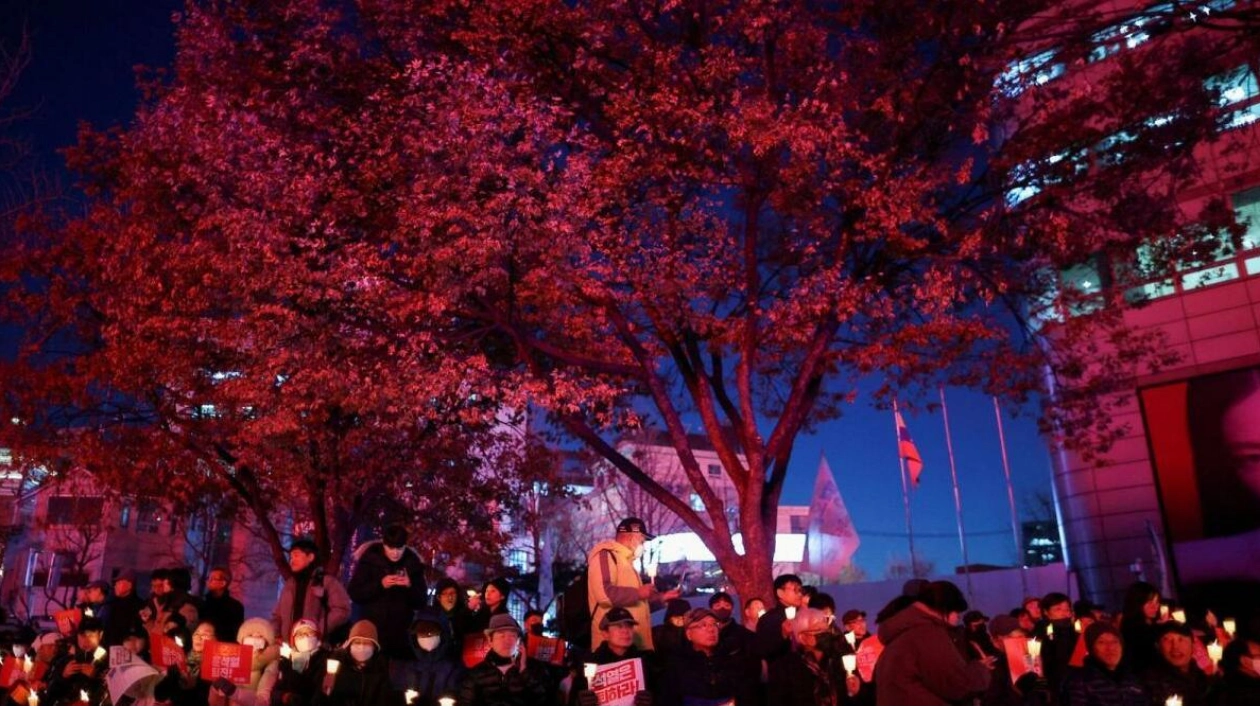People assembled for a candlelight vigil to denounce South Korean President Yoon Suk Yeol's proclamation of martial law, which was retracted just hours later, and to demand his resignation, outside the National Assembly in Seoul, South Korea, on December 4, 2024. — Reuters
On Wednesday, South Koreans carried on with their usual routines at offices, businesses, and schools, with little indication in the capital Seoul that the six hours of unexpected martial law and high political tension overnight had intruded into daily life. The city of 9 million began the day as usual, with the typical morning rush hour on trains and streets, after President Yoon Suk Yeol rescinded his failed attempt to ban political activities and censor news media just before dawn. However, many were left in shock by the abrupt turn of events, which caused stock prices to drop and the South Korean currency to reach multi-year lows during a period of already weakening economic growth.
Since becoming a republic in 1948, South Korea has seen more than a dozen instances of martial law being declared, but the last time was over four decades ago when Gen. Chun Doo-hwan staged a coup and ruled from 1980 to 1988. Seoul resident Gang He-Soo, 50, recounted waking up by chance and seeing the news. 'At first, I was scared and very confused. I kept thinking, 'What is going on? Is this something that could actually happen in this era?' I couldn't sleep until the martial law was lifted because I was so frightened,' Gang said while walking through Seoul's main commercial and tourist district, Gwanghwamun.
Yoon declared martial law in a live TV address around 10:30 pm (1330 GMT) on Tuesday, only to reverse his decision after parliament defied police and special forces cordons around the National Assembly to vote, compelling him to lift the declaration. The president's office explained that the declaration of martial law was made at night to 'minimize damage to the national economy and people's lives.' South Korean soldiers, armed with rifles, body armor, and night-vision equipment, were seen entering the parliament building in Seoul through broken windows. Helicopters hovered in the night sky above the building.
'It was an experience that I've only seen in movies, and I realized how much more serious it is than I had imagined,' said 39-year-old Seoul resident Kim Byeong-In, expressing concern about the economic impact. 'I'm deeply disturbed by this kind of situation, and I'm very concerned about the future of the country,' Kim added.
Many people stayed up late following the news, which stations continued to report despite Yoon's declaration that media subject to martial law. Just after the news broke, the usually quiet passengers on a Seoul subway train began talking to each other. A man read a news story out to a companion, according to a Reuters witness.
Thousands of people gathered at the riverside National Assembly late on Tuesday and into Wednesday, calling for Yoon's order to be blocked, followed by his arrest and resignation. Almost two-thirds of parliament's 300 members rushed to the National Assembly at night for a vote to reject the martial law. A major South Korean convenience store chain, which declined to be identified to avoid association with the current political situation, reported a 337% increase in canned goods sales between 11:00 pm and midnight on Tuesday, compared to the same period a week earlier. Sales of instant noodle packets jumped 254% and bottled water sales rose 141%, a spokesperson told Reuters.
Some companies advised employees to work from home overnight, but business outlets remained open, and the morning rush hour proceeded as normal. South Korea's largest union coalition, the Korean Confederation of Trade Unions, announced on Wednesday that tens of thousands of its members would strike until Yoon resigns, with a rally planned for the evening in downtown Seoul. Several other protests were expected on Wednesday.
'I only knew that martial law had been declared for some reason, but it ended without anything significant, making the reason seem meaningless. It just felt a bit strange to me,' said Seoul resident Park Jun-Yeop.
Source link: https://www.khaleejtimes.com






